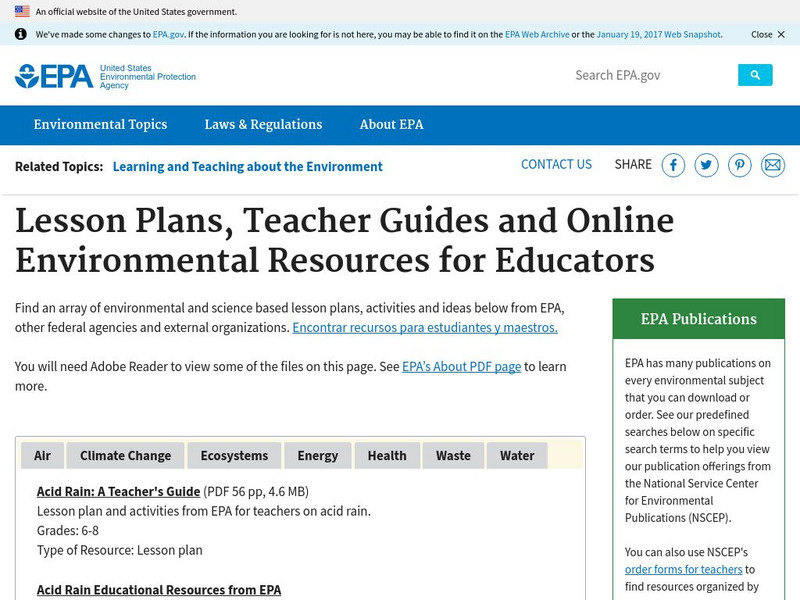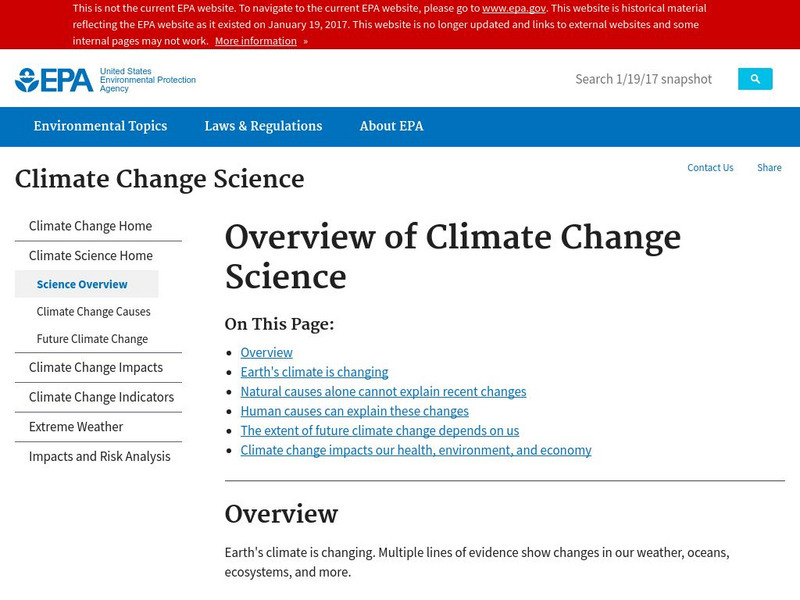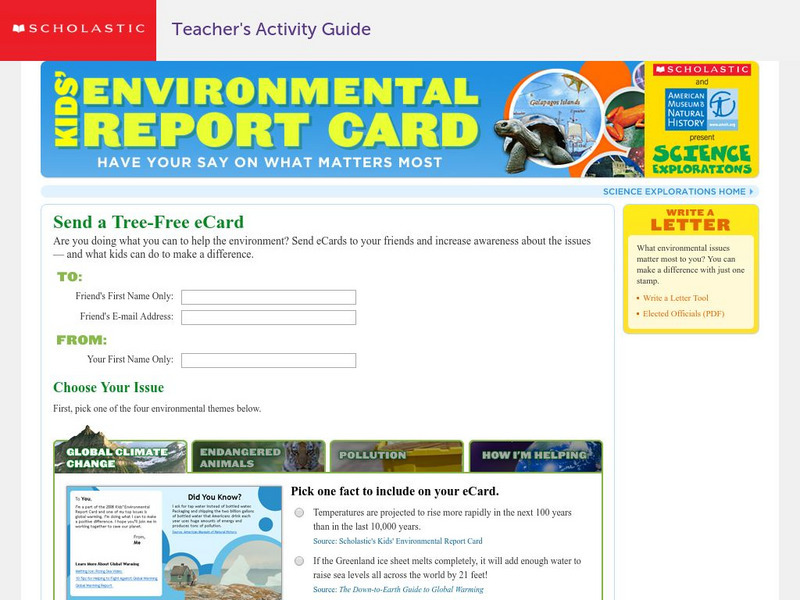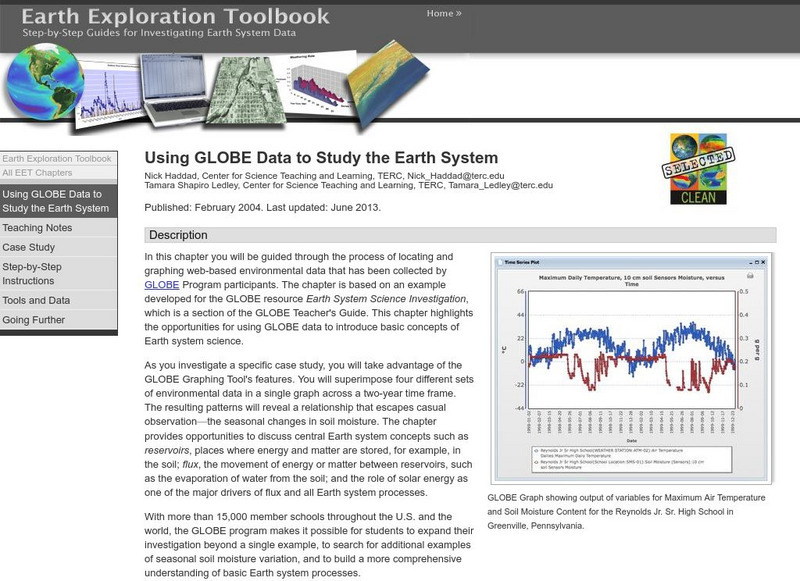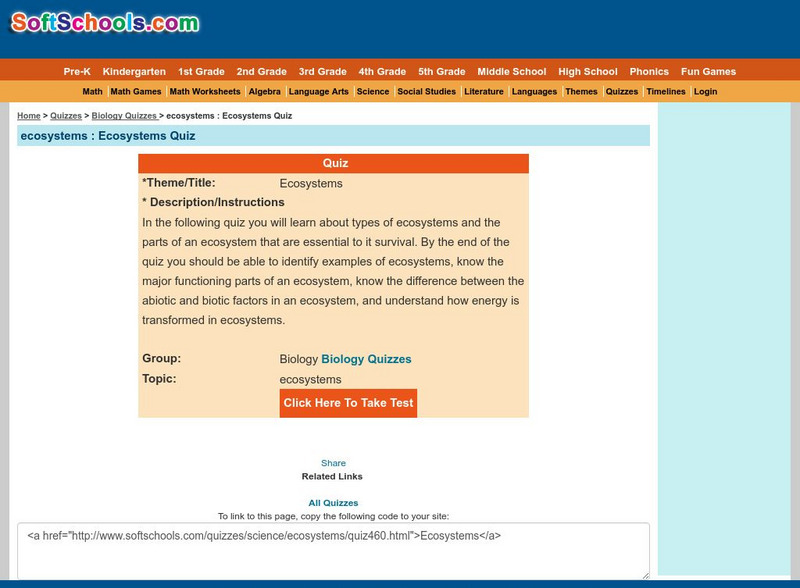US Department of Energy
U.s. Department of Energy: Office of Science
The Office of Energy Research, a division of the U.S. Department of Energy, conducts energy research in various subjects from biological and environmental issues to nuclear physics, and results are published here.
US Environmental Protection Agency
Epa: Lesson Plans, Teacher Guides and Online Resources for Educators
Find an array of environmental and science-based lesson plans, activities and ideas from the EPA, other federal agencies, and external organizations.
US Environmental Protection Agency
Epa: Climate Change
Comprehensive site on climate change includes basic information on greenhouse gas emissions, health and environmental effects, regulatory initiatives and what people can do at home, on the road, at the office and at school to reduce...
Scholastic
Scholastic: Science Explorations: Kids' Environment Report Card
Cast your vote on the important environmental issues. Associated with each issue, there are at least three links to sites which can further your understanding of the issue. To encourage others to respect the environment, you can also...
Concord Consortium
Concord Consortium: Stem Resources: Wind Generator
Using a voltage sensor, students will measure how much "electricity" is produced by the wind turbine that they design and build. Students will experiment with blade designs to see which one collects energy from the wind the most...
Alabama Learning Exchange
Alex: "The Lorax" an Environmental Issue
Students watch "The Lorax" as an introduction to environmental issues. Students need not have prior knowledge of terms. This lesson plan follows the learning cycle. Students design a plan to make the Truffula trees sustainable and...
PBS
Pbs News Hour Extra: Choosing an Automobile, Understanding Alternative Fuels
This lesson plan encourages learners to look at alternative methods of fuel and explore the various impacts each has on the environment.
Other
Florida Dept. Of Education: Conservation of Renewable and Nonrenewable Resources
In this learning module, students learn to differentiate between renewable and nonrenewable resources, and identify resources that fit into each category. It explains the environmental effects of using nonrenewable resources, such as...
Khan Academy
Khan Academy: Activity: Solar Stadium Challenge
A project for students to imagine they are writing a proposal for a bid to design and construct a football stadium that is heated by solar power. As a structural engineering, the students will be creating this proposal for a new NFL team...
Science Education Resource Center at Carleton College
Serc: Using Plant Surveys to Study Biodiversity
An extended field investigation intended as launch into several concepts in environmental science including biodiversity, human impacts on natural systems, and energy transfer in ecosystems.
PBS
Pbs Teachers: Scientific American: Dragon Science: Dams and Dolphins
Explore environmental impact of building of a dam in China's Yangtze River on endangered fresh water dolphins. Observe the presence and effects of osmotic pressure, measure and compare sedimentation in a waterway and build a turbine.
US Environmental Protection Agency
Epa: Causes of Climate Change
Earth's temperature depends on the balance between energy entering and leaving the planet's system . When incoming energy from the sun is absorbed by the Earth system, Earth warms. When the sun's energy is reflected back into space,...
Science Education Resource Center at Carleton College
Serc: Using Globe Data to Study the Earth System
This lesson guides students through the process of locating and graphing web-based environmental data that has been collected by GLOBE Program participants. The lesson provides opportunities for using GLOBE data to introduce basic...
Read Works
Read Works: Miss Johnson's Plant Experiment
[Free Registration/Login Required] A literary text about a teacher who does an experiment to teach her students that plants need sunlight. A question sheet is available to help students build skills in reading comprehension.
Science Struck
Science Struck: A Helpful Guide to Understand the Photic Zone
The photic zone is the upper layer of the ocean where sunlight can penetrate and support photosynthesis. This article explains the characteristics of this zone, the food chain that exists there, the adaptations of the plants and animals,...
Other
Dotdash: Treehugger: What Is Eco Friendly Technology?
What is eco-friendly technology? Also known as clean tech, green tech and environmental tech, eco-friendly technology can help preserve the environment through energy efficiency and reduction of harmful waste. Green tech innovators use...
Other
Neef: Greening Stem Toolkit
The National Environmental Education Foundation is greening the STEM program in an effort to attend to the demands of the environmental challenges facing the nation and the world in the 21st Century. Lessons included in this toolkit...
Science Education Resource Center at Carleton College
Serc: Sea Ice Extension for the Earth as a System Learning Activity
The purpose of this instructional activity is for students to learn how the Earth's systems interact on a global level. They will examine global environmental data and compare this to data on the polar regions. In the process, they will...
Other
Open2.net: Ecosphere
Designed by the Open University and the BBC, this website from Open2.net explores ecosystems. Included is a lengthy discussion on closed ecosystems and their importance to research, as well as a virtual ecosystem, an interactive showcase...
Alabama Learning Exchange
Alex: Biodiversity: Local Ecosystem & Food Web
This is a hands on lesson in which students will explore their local community to identify living things. It can be used as part of a unit on biodiversity and energy transfer within a biology, zoology, or environmental science course, or...
Soft Schools
Soft Schools: Ecosystems Quiz
Take an interactive quiz over ecology and ecosystems. After completing the quiz, check your score, and then revisit any incorrect question for further review.
Annenberg Foundation
Annenberg Learner: The Habitable Planet: Ecology Lab
Create the parameters of your own ecosystem by choosing which producers and consumers live there. Visualize how the food web operates and species populations change. This simulator mimics the food web within a typical ecosystem and gives...
Other
Conservation Corps Newfoundland and Labrador: Climate Change Club
Join the fun at the Climate Change Club where you can find out ways to take action at home, in school, and in your community. Keep up with the latest news in climate science, and link to fact sheets and other fun sites that care about...
US Geological Survey
Usgs: Earth Surface Dynamics (Research Activities)
This site from USGS provides several activities to help understand the interrelationships among earth surface processes, ecological systems, and human activities. Also included are links to new findings and programs concerning Earth...



